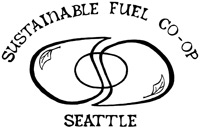Dr. Dan’s fuel has been winterized, and should withstand normal winter use in the Puget Sound region. We will email cold weather advisories if the weather is too cold for winterized fuel use (Click here to sign up for our email list). If you plan on visiting a colder climate or if your vehicle will be sitting unused for an extended period, consider blending some clean, filtered (to 10 microns or lower) diesel into your fuel tank. We also recommend that you use a product like Power Service’s Diesel 911 or Clear Diesel once a year to combat water or bacteria in your fuel tank.
In very cold weather conditions (when the average temperature is below freezing and the ground is frozen solid), non-winterized biodiesel or fuel from unknown sources can gel. When the average temperature is below freezing for an extended period of time, preventative action should be taken. Gelling can generally be prevented by blending with petroleum diesel. B80 made with fuel purchased at our locations during the winter is sufficient for most local conditions, though lower blends (B50 or B20) may be necessary at lower temperatures or if using fuel from other suppliers who have not winterized. If buying biodiesel from an unknown source, see the calculation graphs in the Good Book of Biodiesel. In case there is an extended cold snap, you may want to keep a jug of winterized petro-diesel at home.
Keep in mind that running the vehicle warms the fuel, and keeping the vehicle in a heated garage can also prevent gelling. Additionally, vehicles with more exposed fuel tanks and filters run a higher risk of gelling. In the event of gelling, applying heat will reconstitute the fuel. Be aware that repeated attempts to start the engine can eventually draw air into the fuel lines, resulting in a breakdown.
While this advice applies to fuel purchased at Dr. Dan’s and the Sustainable Fuel Coop, not all biodiesel is created equal. Some may not have been winterized or appropriately blended and we have seen non-winterized biodiesel with gel points in the 50°F range. So be careful out there and know your source of fuel!
Go to www.drdansbiodiesel.com to subscribe to our email list for cold weather updates and advisories!



